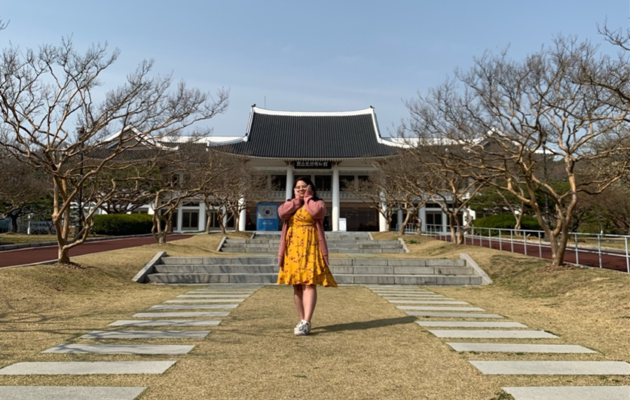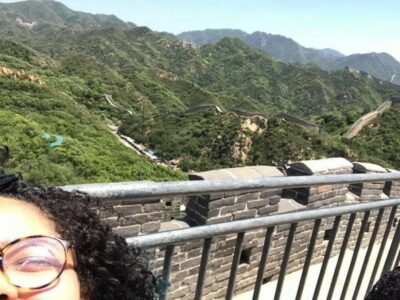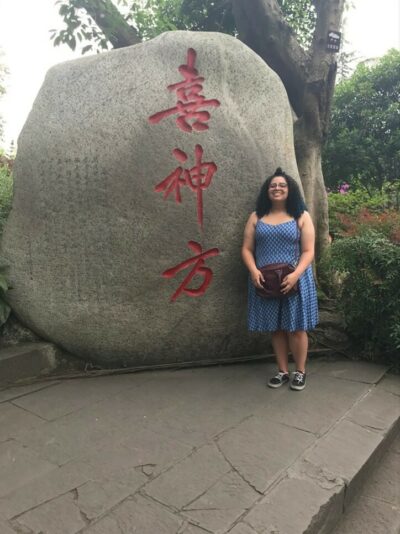Ask Away: 5 Questions for a Future Professor Exploring Mandarin & Korean

We’re asking students, recent grads, teachers, and counselors five questions on how languages play a role in shaping personal and professional success…
Meet Kayla—a Howard Community College and University of Maryland, Baltimore County graduate with associate’s and bachelor’s degrees in Asian Studies (as well as a Korean Language and Literature minor) learning Korean, Mandarin, Tagalog, Spanish, and Vietnamese.
1. What first motivated your interest in language learning? Could you share with us some of your earliest experiences learning languages as a child and teen?
My Aunt is wholly responsible for getting me interested in learning languages. I was a late bloomer and didn’t speak at all until I was three years old, but my Aunt was extremely patient with me and encouraged me to explore learning other languages since I refused to speak English. As a kid, I was absolutely obsessed with Madeline and my Aunt began to help me learn French by buying me any and all ‘French for kids’ CDs she could find. She would also speak to my sister and me in Spanish and would not respond unless we spoke it back to her.
As I got older, my interests changed and I started learning Mandarin informally in 8th grade and in the classroom beginning in 9th grade. I lost all ability to speak French as my Mandarin got better, but have recently been trying to get back into it!
2. In college, you discovered Chinese brush painting: How would you say that learning about this part of the culture shaped your exploration of the language?

Chinese brush painting unites a multitude of different art forms such as calligraphy and poetry and required much more than an interest in painting to fully enjoy it. In order to better understand and produce brush paintings I believed that I had to be well-versed in Classical Chinese, in Chinese linguistics, and in Chinese aesthetic traditions.
Chinese brush painting really solidified my interest in learning all that I could about China and it has followed even now as I am no longer an art major. Since then, I have completed several projects in my undergrad career that tie Chinese brush painting to topics such as Asian American Identity and Shifting Aesthetics due in part to the Cultural Revolution.
Chinese brush painting is also what led me to China for three different study abroad opportunities.
3. From 2015-2017, you completed three study abroad experiences with an arts focus. In what ways were you able to use and practice your Mandarin skills during that travel? Could you share with us one or two memorable or moving anecdotes?
Each time I went to China I was one of the more proficient Mandarin speakers and as a result, I took on the role of translator for my friends (a situation I found myself in again when I studied abroad in South Korea).
Learning a language in a classroom somewhat disconnected from the country of the language you are learning does its best to prepare you for when you may find yourself abroad. But, once you are in the back of a taxi trying to explain where you want to go, the culmination of all the hours you practiced seem nonexistent. I felt as if I learned more in my short times in country than I had in my then 6 years of learning in the classroom!
The friends I made in China and our experiences together are all so memorable, but staying up until 4 in the morning the day before our flight to Beijing as we all sang Chengdu will never be beaten.
In that moment, it felt as if there was no language barrier between my classmates from my home university and our new friends from Sichuan University.
4. We’d love to hear about your favorite course or other favorite experience while learning & tutoring Chinese at the University of Maryland, Baltimore County (UMBC) where you were an Asian Studies major!

There were so many amazing courses I got the opportunity to take when I was a student at UMBC! I don’t think I could name only one if I tried—the teachers in the Asian Studies department and Modern Languages and Literature (MLL) department were all so lovely.
In my first year as a transfer student, I took a History course titled “Mao’s China and After” where I discovered my interest in scar literature and literary trauma theory (what I am currently researching as a grad student). My Professor was incredibly kind and knowledgeable and I learned so much about myself and my research interests.
Another standout class taught by the MLL department that fundamentally changed my interests was "Modern China: Culture, Society, and the Environment." At this time, I knew that I was interested in researching Chinese literature but did not have any understanding in how my interests could be related to initiating change. In this class we explored environmental policies in China in relation to the novel Wolf Totem by Jiang Rong and I honestly did not think I would have as good a time as I did in the class, but it was taught so well.
Overall the professors at UMBC really made me want to become a professor!
5. In addition to Mandarin, you’re also learning Korean and added a Korean minor to your undergraduate degree. What inspired you to learn the language? Any practical tips for others?
My interest in learning Korean was born out of necessity! I’m not a very patient person and as I got more and more into watching Korean dramas, I needed to be able to understand Korean when subtitles weren’t readily available. I did not actually take any Korean language course until 2015, but I found it to be surprisingly easy due to how much I studied on my own.
When I found a drama that I particularly loved (this is back when I was a teenager, so think shows like Coffee Prince, Secret Garden, and Boys Over Flowers) I would watch it once with subtitles then again without—taking notes of what I did and did not remember/understand. And I would spend time doing this everyday: I am not ashamed to admit I have entire scenes memorized because of this! Since I had never taken a class and only learned through listening, I couldn’t read or write at all; that came in 2015.
After I had mastered Hangul, instead of dramas I began reading webtoons in English then in Korean and then I would translate them back into English. I know that it all sounds tedious, but it is so effective in learning and if you find a show or webtoon you enjoy it doesn’t feel like studying at all!
BONUS QUESTION: Please complete this thought: “Learning another language means…”
Learning another language means learning another’s history.
No matter what limitations you think you may have, learning another language is not only possible but truly life-changing.
I am a disabled, first-generation, minority student. I’m the child of a single mother who fought tremendously hard to give me opportunities and has encouraged me immensely to always go and do beyond what I think I am capable of. I am no stranger to imposter syndrome and feeling like I am not smart or good enough, but it is important to remember that you have the opportunities you do because of how wonderful and worthy you are!
Learning another language opens up more doors than you can imagine no matter what field you are thinking about working in.
What's next?
Kayla is now earning a master’s degree in East Asian Languages and Literature at the University of Pittsburgh (and considering a future PhD!), exploring textual analysis and even ways to use technology and computer science to map and compare literature. In the future, they aspire to become a literature professor. We asked them to share a little more about their current research:

I absolutely love taking any opportunity I can to talk about my research!
Currently, I am researching the reconstitution of memory and trauma in East Asian student-led democratization narratives. Basically, how cultural trauma affects a group’s consciousness by leaving indelible marks which become “woven into the fabric of our societies.” In particular, I am looking at the stories of the survivors of the Gwangju Uprising and the Tiananmen Massacre and how they act as counter-sites to the dominant, ‘acceptable’ renditions of these events as they seek to navigate an almost inconceivable and inaccessible territory that had been created and defined by the state.
Delving into these spaces, my thesis seeks to center the stories of survivors (non-Western agents) in order to reconstruct the theoretical framework that we use to analyze the nuances of cultural trauma. I am in no way tech-savvy and have only my fiancé to thank for teaching me to code, but have found myself gravitating towards the digital humanities as I comb through dozens and dozens of primary sources related to these events.
Check out our Connect with Mandarin and Korean pages to explore language scholarships, university programs, testimonials, and more! And, as always, visit @LangConnectsFdn on social media to share your story with us.
